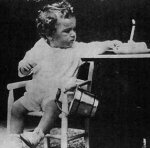 The baby did indeed have a head full of thick, blond curls you would naturally tousle. This is evident in most photos of him, but the best, I think, is of him standing on a bench, flanked by two Westies and two Scotties. The snapshot was taken in the summer of 1931 – not long after his first birthday, and less than a year before he would be kidnapped and murdered.
The baby did indeed have a head full of thick, blond curls you would naturally tousle. This is evident in most photos of him, but the best, I think, is of him standing on a bench, flanked by two Westies and two Scotties. The snapshot was taken in the summer of 1931 – not long after his first birthday, and less than a year before he would be kidnapped and murdered.
On March 1, 1932, sometime after he had been put to bed at 7:30 pm and before 10 pm when his nanny went in to adjust the electric heater, someone had climbed up through the second floor window and had taken Charles A. Lindbergh, Jr. They took no blankets or bedding, and left behind muddy footprints, and a kidnapping note. The little boy with the head of thick curls was later found dead. Between that March night, and the execution of Lindbergh driver, Bruno Hauptman in 1935 (even beyond), the Lindberghs lived a nightmare from which they could not awake.
Charles Lindbergh was the most famous man in the world at the time. The media glare on Charles and Anne, both private people, was withering. After Hauptman’s execution Charles refocused his energies on aviation, and Anne, his co-pilot/navigator/radio operator went with him. Anne also began to write. Her first book, North to the Orient, was an account of a pioneering flight she and Charles had made in the late summer of 1931 from Washington D.C. to Nanking, China via the polar region. She reconstructed that flight, taken four years and a lifetime in the past, by gathering, as a resource, the letters she had written home. This had to be both painful and cathartic, because the letters are filled with longing for, and questions about her baby, who was staying with her mother in Maine. There is one incident from the trip, cut almost word for word from a letter to her mother and pasted into the book, which is particularly poignant.
She is in Hakata, Japan, and has been honored with a traditional Tea Ceremony. Outside, little boys are trying to catch dragonflies in the dying dusk with special bamboo poles. Added to the sound of the summer evening, the drone of the dragonflies, and the boisterousness of the boys is the soft voice of a woman chanting a Haiku. Her host translates it for her:
I wonder how far
In chase today
My dragonfly hunter has gone.**
She is told it is the song of a mother whose little boy has died.
I can’t imagine what it was for her to reread that letter in 1935 – and then to include it in her book without a single comment concerning the night of March 1, 1932. But maybe in her book, as in her dreams, little Charles is still alive. Maybe it is that when she writes about 1931, she misses a child that is safe with her mother back home on the sunny Maine coast.
We have our parental urges – to protect, to shelter, to provide, to kiss cherry cheeks and tousle curly hair – because God put them in us, because they were in Him first (Matthew 7.9-12). I think about Anne Morrow Lindbergh’s terrible ordeal, and the ordeal of the parents the 5 o’clock news brings into my den every evening who have lost their children, and shudder, and pray. When I pray I am speaking into an empathetic ear. God knows.
God is a parent who know what it is to loose a child – and I’m not just speaking about Jesus, whose death on the cross was followed by homecoming and glory. Every child born is God’s, and carries within the spirit of God (Psalm 127.1; Ecclesiastes 12.7). From Adam and Eve on, however, we have all eventually been lost to him because of sin (Romans 3.9-23). Everything God has done since Eden has been an effort to get his kids back. That day of reunion is the one he longs for (Isaiah 43.1ff). It is why Jesus came (Hebrews 2.14-18).
In the old Japanese poem the mother can only wonder how great a distance separates her from her son. Anne Morrow Lindbergh could only have her boy back in her dreams and on the page. God is not limited by the finality of death. He makes it possible that all who will come home can come home. God’s only limit to having all his children back is our own willingness.
** North to the Orient, by Anne Morrow Lindbergh, p.186.

